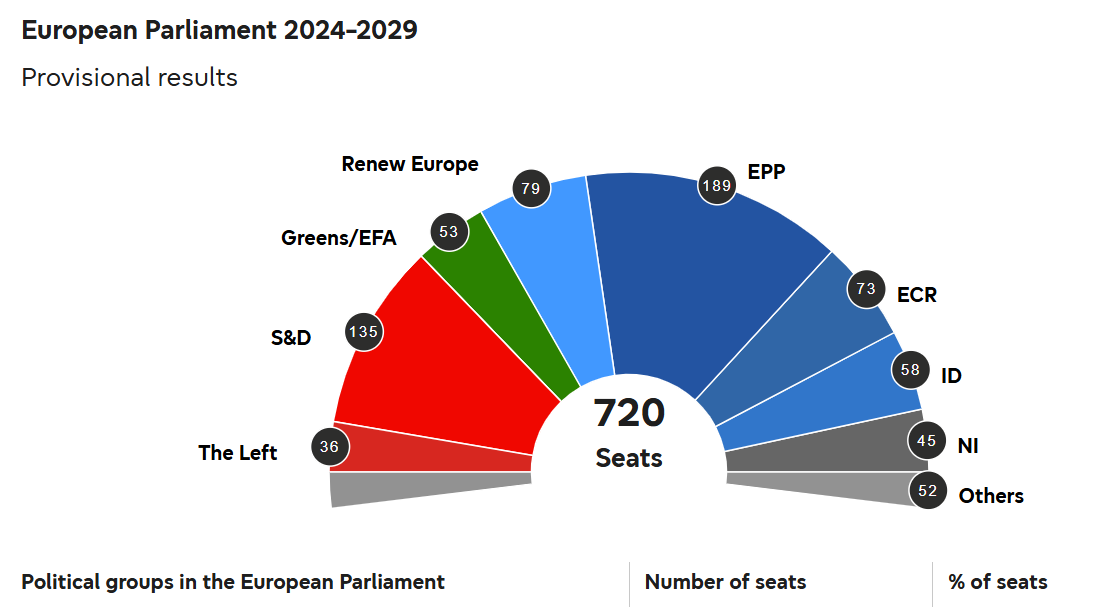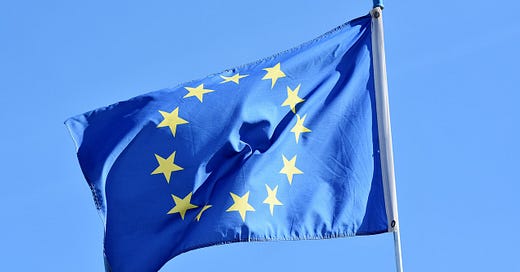EU Tilts Right as Economy, Migration Sway Voters
EU results could be a bellwether for US elections in November
The European Union (EU) tilted decisively toward the political right when millions of citizens cast their votes in hopes of a better economic future, an end to conflict and pledges to crack down on rampant immigration.
The election results had an immediate impact on the EU political landscape.
France plunged into political turmoil. President Emmanuel Macron dissolved the country’s parliament and called for snap elections after Marine Le Pen's anti-immigrant National Rally made historic gains in the EU vote.
Spain's labor minister and one of the country's three deputy prime ministers, Yolanda Diaz, stepped down from the left-wing Sumar alliance following its poor showing in the EU elections. Belgian Prime Minister Alexander de Croo resigned after his party, the Open Flemish Liberals and Democrats, lost heavily in federal elections to the right-wing New Flemish Alliance.

Hundreds of millions of Europeans voted from June 6-9 to select 720 members to serve five-year terms for the European Parliament, the legislative branch of the 27-member bloc.
The results raised doubts about how EU centrist politicians will be able to implement policies, such as 2030 climate change targets, North Atlantic Treaty Organization defense spending commitments, and bilateral trade agreements, after voters issued their verdict.
The diverse political parties will need to agree on whether to keep European Commission (EC) President Ursula von der Leyen as head of the bloc. While she is the clear front-runner, given the success of the centrist coalition parties, the shift right no longer makes her a shoo-in.
Markets React
Markets reacted quickly to the results, reflecting concerns about Macron’s risky election gamble and the results across the bloc. Macron’s decision to dissolve parliament added pressure to France’s fragile economy — already burdened with growing debt and a credit downgrade by S&P Global Ratings.
The euro fell to its lowest in a month, reaching 1.07200, and the pan-European Stoxx 600 index was down 0.65% to 517.29. French banks were sharply lower following the shock news, with BNP Paribas (BNP.PA) and Societe Generale (GLE.PA) leading Stoxx 600 losses, both down by around 8% since the election results.
French bonds extended their drop, pushing the 10-year yield to its highest this year. The benchmark rate rose as much as nine basis points to 3.338%, the highest since November.
“Traders have been swift to affix a political risk premium to euro-zone assets in the aftermath of the weekend parliamentary elections, which will keep options prices elevated over the next month or so,” Ven Ram, a cross-asset strategist for MLIV in Dubai, said.
Europe’s Economy
Ahead of the elections, the EU’s economy remained anemic.
The International Monetary Fund described in an April report the bloc’s economic recovery as “feeble and reflective of “weak consumer sentiment, the lagged effect of higher energy prices, and weakness in interest-rate-sensitive manufacturing and business investment.”
A survey conducted by the polling platform Focaldata and shared with Reuters, showed that “improving the economy and reducing inflation” ranked highest among citizens when asked what was the most important thing influencing their vote.
International conflict and war was the second most important concern, followed by "immigration and asylum seekers” in the poll of 6,000 citizens in the EU's five biggest countries by population - Germany, France, Italy, Spain and Poland - plus Sweden.
‘Asylum Seekers’
German respondents ranked "immigration and asylum seekers" as their top concern, followed by wars and then economic concerns, according to Focaldata.
Reflecting public frustration with immigration, Chancellor Olaf Scholz’s center-left coalition secured less than a third of the vote. The main opposition conservatives, the CDU/CSU alliance, came out on top, while Alternative for Germany, the anti-immigration party, came second.
In Italy, where immigration remains a public issue, Prime Minister Giorgia Meloni’s far-right party won the EU elections with a strong 28% of the votes, bolstering her leadership at home.
Christine Nissen, an analyst with the Copenhagen-based think tank Europa, said migration was “important for the voters” in southern Europe.
Sweden Bucks the Trend
Despite gains made by the far-right, pro-European parties still held a comfortable majority. The center-right European People’s Party (EPP) of EC president von der Leyen remained the strongest group in the EU parliament.
Sweden proved to be one of the few European countries where the far-right is in retreat.
The Swedish populist party, the Sweden Democrats, faced an electoral setback, coming fourth with 13.2% of the vote, down 2.2%. They came in behind the opposition Social Democrats (24.9%), the conservative Moderates (17.5%) and the Greens (13.8%).
The EU election results may sway the Swedish government to use more of its strong public finances to prop up its weakened economy. The Greens, which made some of the largest gains in the elections, support increased government spending on climate change targets.
A US Bellwether
The tilt toward the political right in Europe could be a bellwether for the US presidential elections in November, when similar issues will be contested. Europeans and Americans have watched millions of illegal immigrants enter their countries, despite poll after poll showing that they wanted border measures enforced.
A survey in March showed that 51% of Europeans had a "negative" assessment of the bloc's impact on migration policy, while only 16% had a "positive" view.
Immigration surged to the top as the number one problem in the US, where Americans named immigration as the most important problem facing the country (28%) in February compared to previous month (20%).
Vivek Ramaswamy, an American entrepreneur and Trump-allied politician, said on X that the results in Europe reflected “believing in national borders & the rule of law is actually just mainstream” rather than a tilt to the political right as media claimed.
Tesla CEO and X owner, Elon Musk, responded to Ramaswamy’s post with “exactly.”






